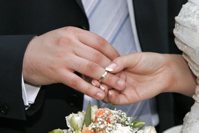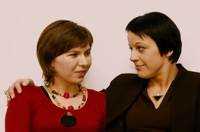Sacrifice is good for you.
No, no, I’m not talking about the pass-on-decadent-chocolate-cake kind of sacrifice (although that may well be good, too). I’m talking about “Do unto others as you would have them do unto you”. I’m talking about sacrificial kindness.
Like the crummy morning when our alarm clock jolted me awake at 4:45 a.m., for instance. I lay in bed listening to the pounding rain and tried to remember whatever possessed us to set it for such an ungodly hour. Then it came to me. My husband had volunteered to drive my daughter from our home in Santa Barbara to the Los Angeles airport so she could take advantage of a cheap but early flight.
 One hundred miles down the coast, he would drop her off at the airport, then he’d turn right around and fight the notorious L.A. morning commuter traffic all the way back home. The trip took him over five hours. He never uttered one word of complaint.
One hundred miles down the coast, he would drop her off at the airport, then he’d turn right around and fight the notorious L.A. morning commuter traffic all the way back home. The trip took him over five hours. He never uttered one word of complaint.
Sacrificial acts of kindness. A good marriage requires them. So does parenthood. Friendship, too. And just being a good citizen of the world.
 In my eighth year of care giving for my first husband, when his dementia was profound and his care had become overwhelming, I allowed myself a rare couple of hours away from home to attend a Christmas party. A woman I had never met before made the mistake of introducing herself, casually saying, “Hi, I’m Jan. How are you?” I opened my mouth to say the obligatory “Fine,” but instead what came out was eight years of pain. I can still see the shocked look on Jan’s face. I also remember my own desperation—I actually took breaths in the middle of my sentences to make it difficult for her to break in and say she had to go!
In my eighth year of care giving for my first husband, when his dementia was profound and his care had become overwhelming, I allowed myself a rare couple of hours away from home to attend a Christmas party. A woman I had never met before made the mistake of introducing herself, casually saying, “Hi, I’m Jan. How are you?” I opened my mouth to say the obligatory “Fine,” but instead what came out was eight years of pain. I can still see the shocked look on Jan’s face. I also remember my own desperation—I actually took breaths in the middle of my sentences to make it difficult for her to break in and say she had to go!
 But I’ll never forget that dear woman, because when I finally shut my mouth, she didn’t run away as though I were a crazy person. Instead she said gently, “Let’s decide how I can help you.” And she did. Right then. She said she would bring dinner the next night, then would come over regularly and read to my husband so I could have a break. Even though she didn’t know me. Even though she was just moving to town and busy settling into a new house. Even though she had a full-time job.
But I’ll never forget that dear woman, because when I finally shut my mouth, she didn’t run away as though I were a crazy person. Instead she said gently, “Let’s decide how I can help you.” And she did. Right then. She said she would bring dinner the next night, then would come over regularly and read to my husband so I could have a break. Even though she didn’t know me. Even though she was just moving to town and busy settling into a new house. Even though she had a full-time job.
Sacrificial kindness has a profound impact on the lives of the recipients. I can attest to that. But did you know that it also brings positive health benefits to the giver? Sure, people who extend themselves in such ways agree that it makes them feel good. But a number of scientific studies have shown that acts of extreme kindness also deliver significant physical and mental health benefits.
One study was conducted by Allan Luks, former executive director of the Institute for the Advancement of Health and the executive director of Big Brothers/Big Sisters of New York City. He did an extensive study of kindness and documented his findings in his book, The Healing Power of Doing Good: The Health and Spiritual Benefits of Helping Others. Almost 3,500 people of different ages, from more than 20 organizations and from all around the country, responded to his 17-question survey. After a computerized analysis of those responses, Luks found a clear cause-and-effect relationship between helping others and good health.
 Some of Luks’ findings:
Some of Luks’ findings:
– Helping others not only contributes to maintaining one’s own good health, but it can actually diminish the effects of diseases and disorders—even serious ones.
– Performing a kind act leads to a “euphoria rush,” followed by a longer period of calm, often called a “helper’s high.” We’re talking actual physical sensations here. The initial rush is followed by a longer-lasting period of just plain feeling good.
– Many health problems are stress-related, and these tend to improve after extending oneself in kind ways. For instance, depression diminishes. So do anger and feelings of isolation, things that can cause a person to overeat or develop ulcers. For some people, extending kindness even decreases the constriction in the lungs that leads to asthma attacks.
– Sacrificial kindness can enhance a person’s joy, emotional resilience, and vigor. Other benefits are an increased sense of self-worth, greater happiness, and a more optimistic outlook.
– Pain can actually decrease as a result of a kind deed. The euphoria rush releases endorphins, which are the body’s natural painkillers.
– Even when the deed is past, just remembering it brings back the health benefits.
– Bonds form between the one who is sacrificially kind and the one who receives the kindness. (That was certainly true of Jan and me.) And this bond can actually strengthen your immune system.
Wow! What a payoff for putting yourself out for the sake of someone else!
 Oh, there’s another thing, too. Sacrificial kindness is catching. You extend kindness to another, and that person is far more likely to extend kindness to someone else. It expands and expands, from person to person to person, like ripples spreading on a pond’s surface after you throw in a stone. It is many acts of sacrificial kindness all taken together—in families, in neighborhoods, in schools and churches and workplaces, from one city to the next and from one country to another—that can change the world.
Oh, there’s another thing, too. Sacrificial kindness is catching. You extend kindness to another, and that person is far more likely to extend kindness to someone else. It expands and expands, from person to person to person, like ripples spreading on a pond’s surface after you throw in a stone. It is many acts of sacrificial kindness all taken together—in families, in neighborhoods, in schools and churches and workplaces, from one city to the next and from one country to another—that can change the world.
“In lieu of Christmas presents, this year we donated enough money to build a house for a family in India. We figured if we were fixing up our own house, it was a good idea to help someone get one.”
– Caroline and Phil, who practice sacrificial kindness


1. Consider how you have done sacrificial kindness. What prompted you to do what you did? How did it shape your life? In what ways did it add to your physical fitness and wellbeing?
2. Consider your family, neighbors, friends, coworkers and those in your community. To whom can you extend some sacrificial kindness within the next few days? How can your church, gym or network of friends organize to intentionally do both one-time and ongoing sacrificial kindness?
3. What is the difference between sacrificial kindness and the popular saying “random acts of kindness”? How can the Christian faith take kindness from being simply a good deed into being something greater? Take some time now to pray and seek God for wisdom and revelation on this topic.









